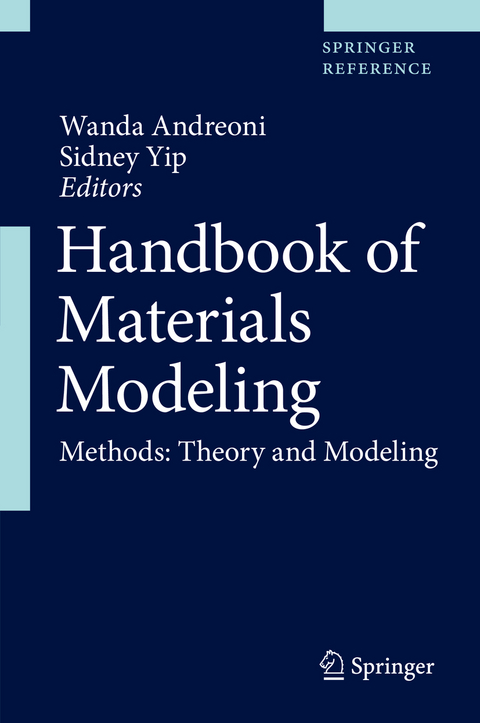
Handbook of Materials Modeling
Springer International Publishing
978-3-319-44676-9 (ISBN)
The Handbook of Materials Modeling, 2nd edition is a six-volume major reference serving a steadily growing community at the intersection of two mainstreams of global research: computational science and materials science and technology. This extensively expanded new edition reflects the significant developments in all aspects of computational materials research over the past decade, featuring progress in simulations at multiple scales and increasingly more realistic materials models. Thematically separated into two mutually dependent sets - "Methods: Theory and Modeling (MTM)" and "Applications: Current and Emerging Materials (ACE)" - the handbook runs the entire gamut from theory and methods to simulations and applications. Readers benefit from its in-depth coverage of a broad methodological spectrum extending from advanced atomistic simulations of rare events to data-driven artificial intelligence strategies for materials informatics in the set MTM, as well as forefront emphasis onmaterials of far-ranging societal importance such as photovoltaics and energy-relevant oxides, and cutting-edge applications to materials for spintronic devices, graphene, cement, and glasses in the set ACE. The thorough, interconnected coverage of methods and applications, together with a line-up of internationally acclaimed editors and authors, will ensure the Handbook of Material Modeling's standing as an enduring source of learning and inspiration for a global community of computational materials scientists.
Wanda Andreoni is Emeritus professor of physics at the Swiss Federal Institute of Technology of Lausanne (EPFL). She has been involved in computational materials science since the early days of her research activity, in both academic and industrial institutions, covering also teaching, organizational and research managing positions. Regarding editorial work, she was co-editor of Europhysics Letters (1990-1993) and Editor of "The Chemical Physics of Fullerenes 10 (and 5) Years Later," NATO ASI Series E: Applied Sciences, Vol. 316 (Kluwer, 1996), and of "The Physics of Fullerene-Based and Fullerene-Related Materials", Series on the Physics and Chemistry of Materials with Low Dimensional Structures. Sidney Yip served on the faculty at the Massachusetts Institute of Technology since 1965, becoming emeritus in 2009. His early research was in theoretical studies of particle and fluid transport. He has been broadly involved in atomistic modeling and simulation of materials for more than four decades. Working with a team of 17 subject editors, he edited the Handbook of Materials Modeling, Springer, 2005. He has coauthored the monographs Foundations of Neutron Transport Theory (1967), Neutron Molecular Spectroscopy (1968), Molecular Hydrodynamics (1980), and co-edited Spectroscopy in Biology and Chemistry, Neutron, X-Ray, Laser (1974), and Materials Interfaces - Atomic-Level Structure and Properties (1992). Recently he completed the text, Nuclear Radiation Interactions(2014).
Introduction Plenary Topics Electronic Structure of Materials by ab initio Methods Atomistic Simulations Long Timescale Atomistic Simulations: Accelerated Molecular Dynamics and Adaptive Kinetic Monte Carlo Modeling Tools for Magnetism, Magnetic Materials and Spintronics Modeling of Microstructure Evolution: Mesoscale Challenges Stochastic, Coarse-grained Models of Materials Mechanics Soft Matter/Polymer Simulations Crystal Plasticity: From the Atomic Scale to the Macroscale Materials Informatics.
| Erscheint lt. Verlag | 27.3.2020 |
|---|---|
| Reihe/Serie | Handbook of Materials Modeling |
| Zusatzinfo | XLI, 1987 p. 470 illus., 403 illus. in color. In 3 volumes, not available separately. |
| Verlagsort | Cham |
| Sprache | englisch |
| Maße | 155 x 235 mm |
| Gewicht | 4272 g |
| Themenwelt | Naturwissenschaften ► Physik / Astronomie ► Allgemeines / Lexika |
| Naturwissenschaften ► Physik / Astronomie ► Theoretische Physik | |
| Schlagworte | atomistic simulations • Coarse-grained models • Computational materials science reference • Condensed matter physics • Continuum Mechanics and Mechanics of Materials • Materials modelling reference • materials / states of matter • Mathematical Physics • mechanical engineering & materials • Mechanical engineering & materials • Microstructure evolution • multiscale materials modeling • nanotechnology • Numerical and Computational Physics, Simulation • Physics • Physics and Astronomy • Quantum & theoretical chemistry • Quantum Mechanics/ Molecular Mechanics (QM/MM) • Quantum & theoretical chemistry • theoretical and computational chemistry • Time-Dependent Density Functional Theory (TDDFT) |
| ISBN-10 | 3-319-44676-2 / 3319446762 |
| ISBN-13 | 978-3-319-44676-9 / 9783319446769 |
| Zustand | Neuware |
| Haben Sie eine Frage zum Produkt? |